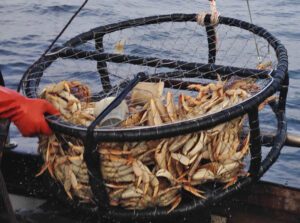
Alaska officials are seeking a federal fisheries disaster declaration for the 2022-23 Bristol Bay red king crab and Bering Sea snow crab fisheries.
Gov. Mike Dunleavy said on Tuesday, Oct. 25 that he also has asked Commerce Secretary Gina Raimondo to expedite a disaster determine for the 2021-22 red king crab fishery.
Dunleavy’s plea to the Commerce Department said information available to him indicated that both crab stock declines were a result of natural causes linked to warming ocean temperatures. The fisheries industry and affected communities in Alaska will need economic relief, he said.
Alaska’s lone member of the U.S. House of Representatives, Democratic Rep. Mary Peltola, has also urged aid for the crab industry, in a letter to Speaker of the House Nancy Pelosi and House Appropriations Chair Rosa DeLauro.
“Thousands of boat owners, crew members, seafood processor workers, wholesalers, retailers and service industry workers are and will be affected by this biologically and environmentally necessary — but economically devastating — shutdown of their livelihood,” Peltola wrote.
She requested inclusion of $250 million in fisheries disaster funding in an end-of-the-year funding vehicle as Congress moves toward adjournment,
Peltola also noted in her letter that stressors to the crab include warmer water, increased ocean acidity and bycatch mortality caused by other gear types working in the crab habitat area, Jamie Goen, executive director of Alaska Bering Sea Crabbers, said that ABSC is very pleased with the governor’s quick action to request a fishery disaster for Alaska’s crab fisheries and encourages Raimondo to act quickly as well as on the next step in the process.
“Without swift action, our second and third generation family fishing businesses risk losing everything,” Goen said.
Dunleavy told the U.S. Commerce Department that losses in exvessel value across the Bristol Bay red king crab and Bering Sea snow crab fisheries for the 2021-22 and 2022-23 seasons are estimated to be $287.7 million. Total losses for crab dependent harvesters, processors, communities and support businesses likely far exceed this loss in exvessel value, he said.
The letter told Raimondo that results of the 2021 and 2022 National Marine Fisheries Service’s Bering Sea bottom trawl survey showed low abundance continuing in Bristol Bay red king crab and sudden, unexpected declines in Bering Sea snow crab abundance across all sizes of crab, and unexpected declines in Bering Sea snow crab abundance across all sizes of crab.
“Available information indicates the reductions in abundance for both crab stocks resulted from natural causes lined to warming ocean temperatures,” the governor said.
The 2021-22 season of the Bristol Bay red king crab fishery was closed for the first time in 25 years and is now closed again for the 2022-23 season due to continued low abundance of mature female red king crab.
Estimated exvessel losses from the back-to-back closures of the Bristol Bay red king crab fishery is nearly $85 million dollars, the governor said. Exvessel losses from the 2021-22 and 2022-23 Bering Sea snow crab seasons are estimated at $202.7 million dollars.
